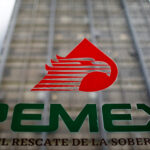From Reuters
HOUSTON (Reuters) – U.S. President Donald Trump’s threats to tax Mexican imports could disrupt a long-standing cross-border energy trade, hitting U.S. consumers and refiners that use Mexican oil by boosting prices, and raising concerns about potential retaliation by the world’s biggest buyer of U.S. energy products.
Mexico sends 600,000 to 700,000 barrels of oil to the United States every day, mostly to refiners that process that crude into gasoline, diesel and other products.
Mexico buys more than 1 million barrels per day (bpd) of U.S. crude and fuel, more than any other country, and analysts are concerned that retaliatory tariffs from Mexico could disrupt that trade.
“I can’t see how the outcomes are going to be constructive,” said Carlos Pascual, a former U.S. ambassador to Mexico who now helps run consultancy IHS Markit’s global energy business.
Trump on Thursday vowed to impose a tariff on all goods coming from Mexico, starting at 5% and increasing monthly until the surge of undocumented immigrants from across the border subsides.
Mexico and the United States, along with Canada, are trying to finish a broad free-trade agreement to replace the 25-year-old NAFTA deal. If implemented, the tariffs would begin June 10. So far Mexico has not said it would retaliate.
The imposition of tariffs may spur “retaliatory actions that impair the development of new markets,” said a spokesman for Chevron Corp, adding the company supports free and fair trade. Chevron has opened 100 retail gasoline stores in Mexico since 2017.
Trade group American Fuel and Petrochemical Manufacturers warned tariffs could raise domestic fuel prices and jeopardize the proposed trade deal. The American Petroleum Institute said the tax could hurt the U.S. economy.
Tariffs could add $2 million to the cost of daily Mexican crude purchases by U.S. refiners, analysts at PVM Oil Associates said.
A sharp decline in supplies from Mexico could raise the cost of fuels overall if U.S. refiners are forced to buy heavier crude grades from further away, adding to shipping costs.
“The Trump administration is putting itself into a situation where it could create a much tighter heavy crude market that could impact the price of gasoline and force refiners to adjust their product slates due to shortages,” said IHS’s Pascual.
However, crude traders noted that most Gulf Coast refiners that buy Mexican crude are located in so-called Foreign Trade Zones, which allow them to avoid tariffs so long as the refined products are exported – though these refiners also supply U.S. markets.
Refiners have been using Mexican heavy crude grades in part to offset the loss of barrels from Venezuela, which has been under U.S. sanctions for months.
Maya crude, Mexico’s primary grade, traded at a $6 a barrel discount to Brent, the international benchmark, on Thursday, according to analysts at Tudor, Pickering & Holt (TPH). They said a 5% tariff would reduce that discount by half.
Discounts on Friday for Western Canadian Select, a rival grade to Maya, was bid at a $16 a barrel discount to U.S. crude, narrowed from $16.60 on Thursday, traders said.
Mexican refineries owned by Valero, Phillips 66, Exxon, Chevron Mexico accounted for 9% of total U.S. oil imports in 2018
The primary importers of Mexican crude include refineries owned by Valero Energy Corp, Phillips 66, Exxon Mobil Corp. and Chevron Corp. Mexico accounted for about 9% of total U.S. oil imports last year, TPH said.
U.S. refiners use heavy crude oil to blend with lighter U.S. oil to produce fuels, but reduced production from Canada and Mexico, along with sanctions on Venezuela, has squeezed that supply.
“For Gulf Coast refiners already hit by Venezuela sanctions, Iran sanctions, Canada’s cuts and OPEC cuts, this adds insult to injury,” said Sandy Fielden, an analyst at researcher Morningstar. “The number of alternative sources of heavy crude is narrowing.”
Weekly data shows U.S. imports from Mexico since the beginning of March have averaged roughly 631,000 bpd, according to U.S. Energy Information Administration figures.
Phillips 66, Marathon Petroleum Corp and Exxon declined to comment. Refiners Valero Energy and Royal Dutch Shell did not reply to requests for comment.







